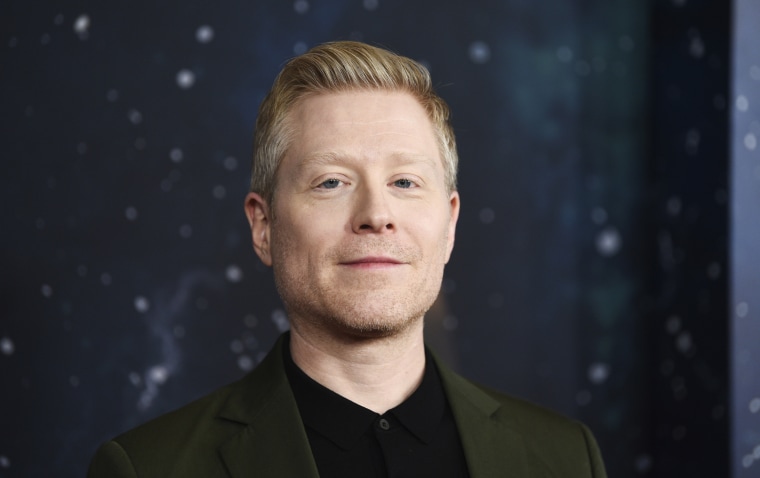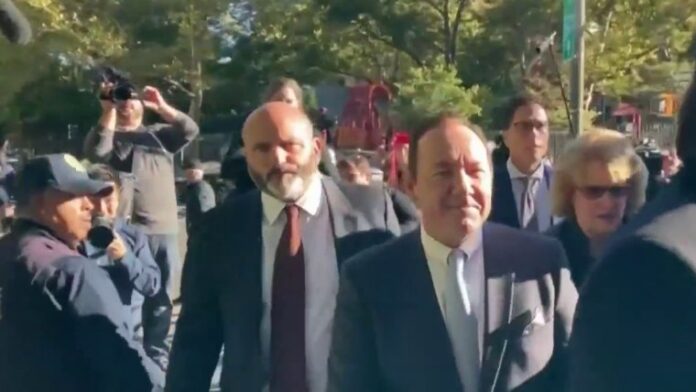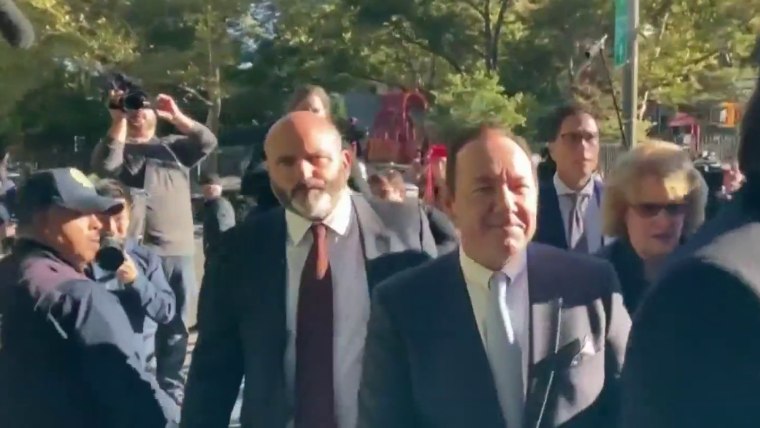Oscar-winning actor Kevin Spacey, taking the witness stand in his sexual misconduct trial Monday, flatly denied Anthony Rapp’s allegation, repeatedly broke down in sobs and grew visibly anguished as he recalled his “humiliating and terrifying” upbringing as the son of a man he described as a “white supremacist and neo-Nazi.”
Spacey, face red and voice shaking, told jurors in New York federal court that he was “forced to listen to hours and hours and hours” of vitriolic “lectures” from his father, Thomas Geoffrey Fowler, instilling in him a “hatred” of bigotry.
“I have never talked about these things publicly,” Spacey said on the witness stand, appearing to fight back tears. “Ever.”
Rapp, a star of the Paramount+ series “Star Trek: Discovery,” alleges that Spacey lifted him up, put him on a bed and climbed on top of him during a party in New York City in 1986, when Rapp was 14 and Spacey was 26.
Spacey’s lawyers have argued that Rapp “created a story” because he was jealous of their client’s success in the entertainment industry.
Rapp filed a lawsuit against Spacey in 2020, and his lawyers are seeking $40 million in damages.
In a significant development Monday, the judge overseeing the trial tossed out Rapp’s claim for intentional infliction of emotional distress. Judge Lewis A. Kaplan said that claim “repeats and re-alleges” Rapp’s allegation of battery.
Spacey, wearing a gray suit and white shirt with a pale pink tie, told jurors at the start of his testimony that he has always valued his privacy and “grew up in a very complicated family dynamic.” He testified that his father, who died in 1992, was frequently unemployed, moving the family from home to home.
Spacey said his father “fell in” with a bad crowd and eventually became what the actor described as a “white supremacist and neo-Nazi.”
Chase A. Scolnick, Spacey’s lead attorney, asked his client to respond to Rapp’s suggestion earlier in the trial that the older actor was a “fraud” for remaining in the closet for most of his public life.
Spacey responded: “To call someone a ‘fraud’ is to, I guess, say that you think they are living a lie. … I wasn’t living a lie. I was just reluctant to talk about my personal life.”
“We have to have empathy … for everyone’s process of coming out,” he said.
Spacey publicly came out as gay in 2017 in response to an article published by BuzzFeed News in which Rapp detailed his allegations to the reporter Adam B. Vary.
In a statement on Twitter the day after the article was published, Spacey said he did not remember the alleged incident but apologized “for what would have been deeply inappropriate drunken behavior.” He added: “I choose now to live as a gay man.”
Spacey expressed intense regret for that statement, telling jurors that he was partly following the advice of panicked publicists and now believes he should not have said he was sorry.
“I’ve learned a lesson: Never apologize for something you didn’t do,” Spacey told the jurors. “I regret my entire statement.”
He said his publicity team encouraged him to take the allegations “seriously” because they were concerned about permanent damage to his career and reputation. In turn, he chose to take them “seriously but not factually.”
“I had no belief that this had happened,” Spacey said emphatically.
Spacey testified that he also laments the decision to use his statement as an opportunity to come out as gay to the general public.
He broke down sobbing as he said: “I was accused by the gay community of trying to change the subject” and “conflating the allegations with being gay, which was never my intention.”
“I would have never done anything to hurt the gay community,” Spacey said, eyes welling up with tears. “It was wrong, it was really bad, and I’m deeply sorry.”
Spacey testified that he had been talking about whether to publicly come out for “more than a year and a half” before the BuzzFeed article was published in October 2017.
He said, by that time in his career, he was “no longer concerned” he would be labeled “Kevin Spacey, gay actor” and would be known simply as “Kevin Spacey, actor.” He insisted “the idea of coming out was not new” or “prompted” by the BuzzFeed article.
The actor testified Monday that he “certainly had a degree of shame” about being gay because he grew up with his father’s hateful views. “I’d grown up in a situation as a child where I wasn’t comfortable talking about these things,” he said.
In the prime of his acting career, he added, he “wanted people to remember the characters” he played — not the man behind them.
Spacey recalled discovering a love for performance as a “shy” boy, in part because “being able to hear my mother laugh” was one of the highlights of his young life. He amused her with spot-on impressions of Hollywood movie stars from the 1930s and ’40s.
The actor interspersed his testimony with brief impersonations of important people from his life, including the actor Jack Lemmon and the New York theater impresario Joseph Papp, describing the latter as a “father figure.” (At least two jurors could be seen chuckling at one of his Lemmon impersonations.)
Rapp said that he met Spacey in 1986 when they were each acting in Broadway shows — Rapp alongside Ed Harris in “Precious Sons,” Spacey with Lemmon in “Long Day’s Journey Into Night.” Rapp testified that Spacey invited him to a party at his apartment.
Rapp alleged that he did not recognize anyone at the party, so he went into a bedroom to watch TV. He testified that at some point, an apparently drunken Spacey entered the room, lifted him up, placed him on a bed and rested his full weight on top of him.
Rapp said he privately told friends about the alleged encounter over the years but felt inspired to go public with his allegations in the early days of the #MeToo movement in October 2017.
Spacey’s side of the story
In his testimony Monday, Spacey for the first time presented his version of events in great detail.
He testified that at that period in 1986 he was living in a studio apartment that did not have a bedroom. He said he threw one party that year — a housewarming gathering in January.
Spacey said he recalls meeting Rapp that April at a luncheon for performers who were appearing in that season’s Broadway shows. He explained the teen did not make much of an impression on him, saying, “He was a kid who was in a play.”
He went on to recall that he saw Rapp again in Lemmon’s dressing room behind the scenes of “Long Day’s Journey Into Night” — only this time, Rapp was accompanied by fellow actor John Barrowman.
Spacey testified that he was “captivated” by Barrowman, who was 19 at the time of their meeting. (Rapp has testified he was under the impression Barrowman was underage.) He said he invited Barrowman and Rapp to dinner near the theater and then took them to a nightclub.
Spacey said he was “more focused” on Barrowman throughout that night, “flirting” with him at the nightclub.
“Anthony Rapp seemed like a kid,” Spacey said. “John Barrowman seemed like a man.”

Rapp has said he and Barrowman went back to his mom’s apartment afterward. Spacey, however, claimed that the three went back to his apartment on the Upper East Side to play with his pet dog and admire his view of the city.
Spacey, recalling that Barrowman sat next to him on a bed, testified that he “made a playful gesture, which you could call a pass,” gently pushing Barrowman back on the bed as they chatted and “giggled.”
In a video deposition played for jurors Monday, Barrowman backed up that account, adding that he was “flattered” and not “threatened” by Spacey’s behavior. He said he did not pursue a romantic encounter because Rapp was in the apartment.
Spacey testified that after that night, “I don’t think I ever had a conversation” with Rapp. He insisted that he had never invited Rapp to a party.
“I have no memory of ever seeing Anthony Rapp at a party, and I knew I had never been alone with him,” Spacey said.
In the fall of 2017, when the BuzzFeed article was published, Spacey was preparing to begin shooting the sixth season of the Netflix drama “House of Cards.”
He recalled that it was the early days of the #MeToo movement, following the first wave of misconduct allegations against film producer Harvey Weinstein, and “my industry and our society was reeling.”
He said that, on Oct. 29, 2017, he learned about Rapp’s allegations from his publicist. He claimed that was the “first time” he had heard about Rapp’s claims. (The article was published that day.)
“I was shocked and I was frightened and I was confused,” Spacey said.
In early 2018, Spacey tried to re-investigate his own past, he told jurors. He looked through old boxes and found records that were introduced as evidence at his trial, including his sublease agreement from 1986 and scanned copies of mail.
Scolnick, nearing the end of his direct questioning of Spacey, asked his client: “Are you confident that what Mr. Rapp alleges has never occurred?”
Spacey replied: “I am 100% confident.”









